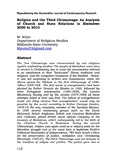Please use this identifier to cite or link to this item:
https://cris.library.msu.ac.zw//handle/11408/1288| Title: | Religion and the Third Chimurenga: an analysis of church and state relations in Zimbabwe 2000 to 2010 | Authors: | Moyo, Mpumelelo | Keywords: | Religion, Third Chimurenga: Church, State Relations, Zimbabwe |
Issue Date: | Aug-2015 | Publisher: | Midlands State University | Series/Report no.: | Repositioning the Humanities: Journal of Contemporary Research;Vol. 1, No. 1; p. 112-150 | Abstract: | The first Chimurenga was characterised by one religious system confronting another. The people of Zimbabwe were slow to convert to Christianity due to what the missionaries referred to as attachment to their “backward” Shona traditions and religions, and the outspoken resistance of the Ndebele. Hence, it was not surprising to settlers and missionaries when the Shona joined the Ndebele in the first Chimurenga of 1896- 7(Baur 2005:309). The first seeds of evangelization had been planted by Father Goncalo da Silveira in 1560, followed by other Portuguese missionaries (1560-1693), the London Missionary Society and by the Jesuits (1879-1889) all these attempts failed to bear any fruit. The failure of evangelization made one thing obvious that evangelization would only be possible by the sword according to Father Prestage (Linden, 1979:10) the only remaining member of the Zambezi Mission. In 1890 several missionary groups such as the Dutch Reformed, British Anglicans, British and American Methodists and Catholics, joined British South African Company in the invasion of Zimbabwe, which subsequently led to the birth of the Christian Church in Zimbabwe. During the second Chimurenga, religion was again used as a rallying point for the liberation struggle and at the same time to legitimize Smith‟s Unilateral Declaration of Independence, “We have struck a blow for the preservation of justice, civilization and Christianity (Rundolph, 1984:24). The third Chimurenga was not immune to the interface of religion and politics. The period gave rise to many religious voices. The study will analyze several documents among them “The Zimbabwe We Want” (2006), the Catholic Bishop‟s pastoral letter “God Hears the Cry of the Oppressed” (2007). The religious and political landscape in Zimbabwe has had a tumultuous relationship. Politicians have sought to use religion to legitimize and further their political and commercial interests. Unfortunately, the churches have by and large succumbed to the political thought of the day. However, no one will deny that religion has had a mitigating influence over the political leadership. Does the Church still have a prophetic voice and role in Zimbabwean politics? To what extent has the church been used by political opportunists for their own gains? These are the key questions that this study endeavours to explore. | URI: | http://hdl.handle.net/11408/1288 | ISSN: | 2312-945X |
| Appears in Collections: | Research Papers |
Show full item record
Page view(s)
376
checked on Feb 21, 2026
Download(s)
144
checked on Feb 21, 2026
Google ScholarTM
Check
Items in MSUIR are protected by copyright, with all rights reserved, unless otherwise indicated.




